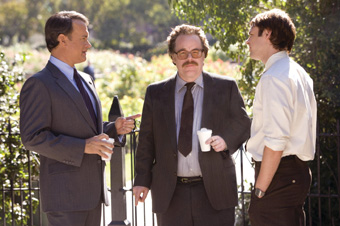| |
"These things happened. They were glorious and they changed the world and then we fucked up the endgame." |
| |
Charlie Wilson on his country's role as the world's Policeman |
It's not every week you see a movie (The Kite Runner) and then a week later another movie (Charlie Wilson's War) which could have been squeezed –uncomfortably on a stylistic level perhaps – into the middle of the first movie. Halfway through Mark Forster's excellent adaptation of Khalid Hosseini's novel, the Russians invade the hero's home of Kabul, Afghanistan. At the time in 1979, America's cold war with the Russians was no closer to thawing out. A right wing Houston socialite, friends with the ruling class of Pakistan (true apparently!), asks a U.S. Congressman to visit a refugee camp for the displaced of Afghanistan. His epiphany at witnessing the hundreds of thousands of refugees, limbless, broken and hopeless, moved him to act. The people of Afghanistan were forced to take an anti-Russian position and to Charlie Wilson this made Afghanistan his enemies' enemy. Funny (no, it isn't) how things change...
Charlie Wilson at that time (Tom Hanks in a role that doesn't exactly stretch him) was a man who took his pleasure seriously. Never without a whisky in one hand and a bevy of angels in the other ("Why doesn't Charlie Wilson go to rehab?" "They don't serve whisky in rehab."), he dispensed common sense justice via bills he voted on as he saw fit bending himself and the rules in the pursuit of one goal – bloodying the collective Russian nose by arming the Afghanistan population. At the start of their horrifically one sided rebellion, they had weapons that could not even scratch the machines that brought so much destruction to their homelands. In doubling aid to Afghanistan from five to ten million dollars (for 'aid' read providing arms), Charlie realizes that it's nowhere near enough.

Returning from Pakistan, he demands to meet with a senior figure in the CIA and gets the disgruntled Gust, a man mocked for his Grecian parentage. It's a match made in the covert corridors of cold war conniving. Gust is played by the brilliant Philip Seymour Hoffman and he crackles each time he's on screen. Gust has found a Congressman with balls who wants to arm the Afghanis (covertly of course) and over the running time of a very short 96 minutes, Wilson gets his way through deft political manoeuvring which in this case means bedding Julia Roberts – what hell it must be to have the ear of the President and the lower than lower back of a powerful right wing beauty. If Wilson comes against any real stiff opposition (sexual innuendo not intended), the film never dwells on this. It's a small flaw methinks, even if the movie is based on the truth. The hundreds of millions he provides from Uncle Sam's coffers translates into Russian arms (US armaments would have been (1) a dead giveaway, (2) the need to re-name 'covert' operations and (3) an invite to the biggest party of them all, World War III. Russian helicopters fall out of the skies). The little man has big toys. It's 2008. I wonder if the toys are still being played with?
Heroes have to surmount great odds, don't they? Wilson's charming and intelligent machinations remind me of William Goldman's assessment of Butch Cassidy and why he got away with what he did get away with. People just liked him. Charlie has no deceit (even though he's a Congressman, he bends when necessary but never breaks or compromises his own moral conviction) and so is able to be himself and friend and foe alike respect him and therefore do his bidding. Ultimately he is officially rewarded for being the consummate Congressman. But again, even though some political commentators credit the man with the eventual fall of communism, we must heed his wisdom quoted above. What might have been Afghanistan's fate if America made the effort to finish what they started... "We'll see," as Gust's story goes.
Director Mike Nichols, like Hanks, is not exactly asked to step too far away from his talent gantry. Neither is the screenwriter, the revered (at least by this writer) Aaron Sorkin, creator and writer of both The West Wing and Studio 60 on the Sunset Strip. The reality of the story isn't meaty enough for its political savvy to really engage. The movie drifts by scoring a few points when Hoffman is ranting but like its hero, the movie gets its own way without too much fuss. Far be it for me to denounce the entertainment value of anything with this much talent attached to it but the left leanings of the sympathetic film-makers are evident for all to read but unlike Lions For Lambs, its politics are skin deep and so do not make too much of an impression.
But I applaud the film-makers for making the movie as a Hollywood film in this climate. The farther the pendulum swings to the right, the more warm bodies we need in the middle to offset the swing. It would be nice – as Robert Redford's movie does – to have a standpoint that is much less than the sum of its centrally heated debate and get some real rebels to probe what left-wing in America really feels like.
|